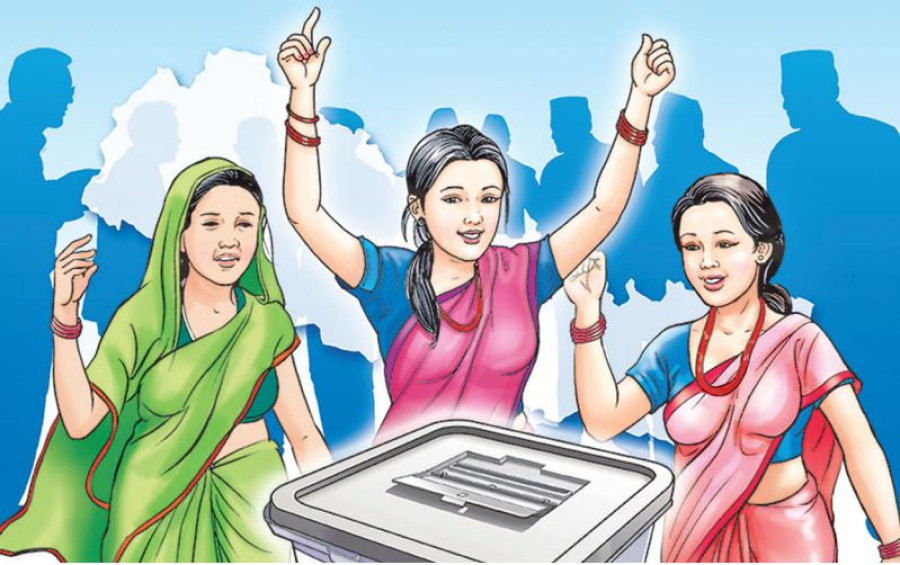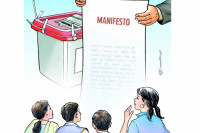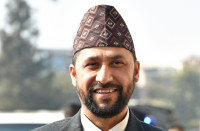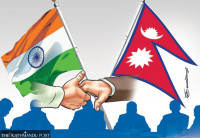National
Keep up our local level representation, women leaders urge Deuba, poll body
Parties fighting elections in an alliance are likely not to field women candidates for both top local government positions, taking advantage of a flaw in the law.
Binod Ghimire
Amid concerns that alliance politics could significantly reduce women’s representation at the local level, cross-party women leaders have drawn the attention of the government and the Election Commission to the principle of proportional representation, demanding that constitutional provisions be followed in letter and spirit while candidacies are filed.
A team of women leaders on Thursday met Prime Minister Sher Bahadur Deuba and Dinesh Thapaliya, chief election commissioner, urging both to ensure that parties don’t field only male candidates as mayor and deputy mayor and chairperson and vice-chairperson at the local level.
Section 17 (4) of the Local Level Election Act-2017 makes it mandatory for a political party to field a woman as candidate for either chief or deputy chief at the local level. However, the same law says that the legal provision requiring one of the two candidates for chief or deputy chief at the local level to be a woman is applicable only when a party fields candidates for both the positions.
As the four ruling parties—Nepali Congress, CPN (Maoist Centre), CPN (Unified Socialist) and Janata Samajbadi Party—and Rastriya Janamorcha have already decided to contest the elections under an alliance and the main opposition CPN-UML is mulling its own alliance with some other parties, women leaders fear loopholes in the law could be exploited, which could hugely reduce women’s representation at the local level.
As elections are being fought under an alliance, the two executive positions in local governments will be shared between alliance partners and they may not field women candidates taking advantage of the flaw in the law.
“The provision is against the spirit of the Constitution of Nepal. We have urged the prime minister and chief election commissioner to make sure that parties field a woman candidate when they contest in just one of two positions,” Binda Pandey, an UML Standing Committee member, told the Post.
Article 38 (4) the constitution says that women will have the right to participate in all state bodies on the basis of the principle of proportional inclusion. Similarly, Article 42 says socially backward women, Dalit, indigenous people, indigenous nationalities, Madhesi, Tharu, minorities, persons with disabilities, marginalised communities, Muslims, backward classes, gender and sexual minorities, youths, farmers, labourers, oppressed or citizens of backward regions and indigenous Khas-Arya shall have the right to participate in the state bodies on the basis of inclusive principle.
“The constitution prevails over the Act. And it is the responsibility of the government and the constitutional commission to implement the constitution,” said Pandey. “Women’s representation can dwindle if the commission doesn't take stern measures to implement the statute in its letter and spirit.”
An encouraging number of women got elected from the last local elections in 2017, marking an important achievement for women empowerment in the country, even though most of the women were elected to deputy positions.
Of the 35,041 elected representatives, close to 41 percent (14,352) were women. Although the parties were reluctant to give mayor or chair positions to women candidates, women were elected in most of the vice-chair or deputy mayor positions—718 among 753 local levels.
Currently, just seven women are mayors and 11 are chairpersons.
Renu Chand, a Central Committee member of the CPN (Maoist Centre) who was part of the delegation on Friday, said the male-dominated political parties are likely to prioritise male candidates in the local elections if the government and the commission do not take stern measures to ensure women’s representation.
“Both the prime minister and the chief election commissioner said that they want to see women’s participation increase at the local level,” she told the Post. “The commission has said it has already directed parties to field a woman when they file candidacy either in mayor or deputy mayor and chairperson or vice-chairperson.”
She said if the parties contesting the elections under an alliance do not want to field women in both the positions, then they should pick a woman candidate for one of the two positions.
“When they do so they must prioritise women candidates for mayor or chair positions,” she said.
Some leaders from the ruling parties say the parties in the coalition must develop a principle that they will field a woman either as chief or deputy chief at the local level. “The issue can be resolved if the ruling alliance takes it seriously. I have raised the issue at different meetings and I request women leaders to continue building pressure,” Gagan Thapa, Nepali Congress general secretary, told the Post. “The more the pressure, the higher the chances of the parties making decisions to improve women’s representation.”
Thapa said the parties must realise that they should not and cannot take regressive steps by decreasing women participation.
Women rights activists say political parties will be violating the constitution if they fail to ensure that women are elected to at least one of the two executive positions at the local level.
“More than half of the voters are women. Depriving women of proportional representation is cheating the entire community,” Meera Dhungana, a women’s rights activist and a lawyer, said. “If parties don’t ensure adequate representation, it can be challenged in the court of law.”




 10.12°C Kathmandu
10.12°C Kathmandu















